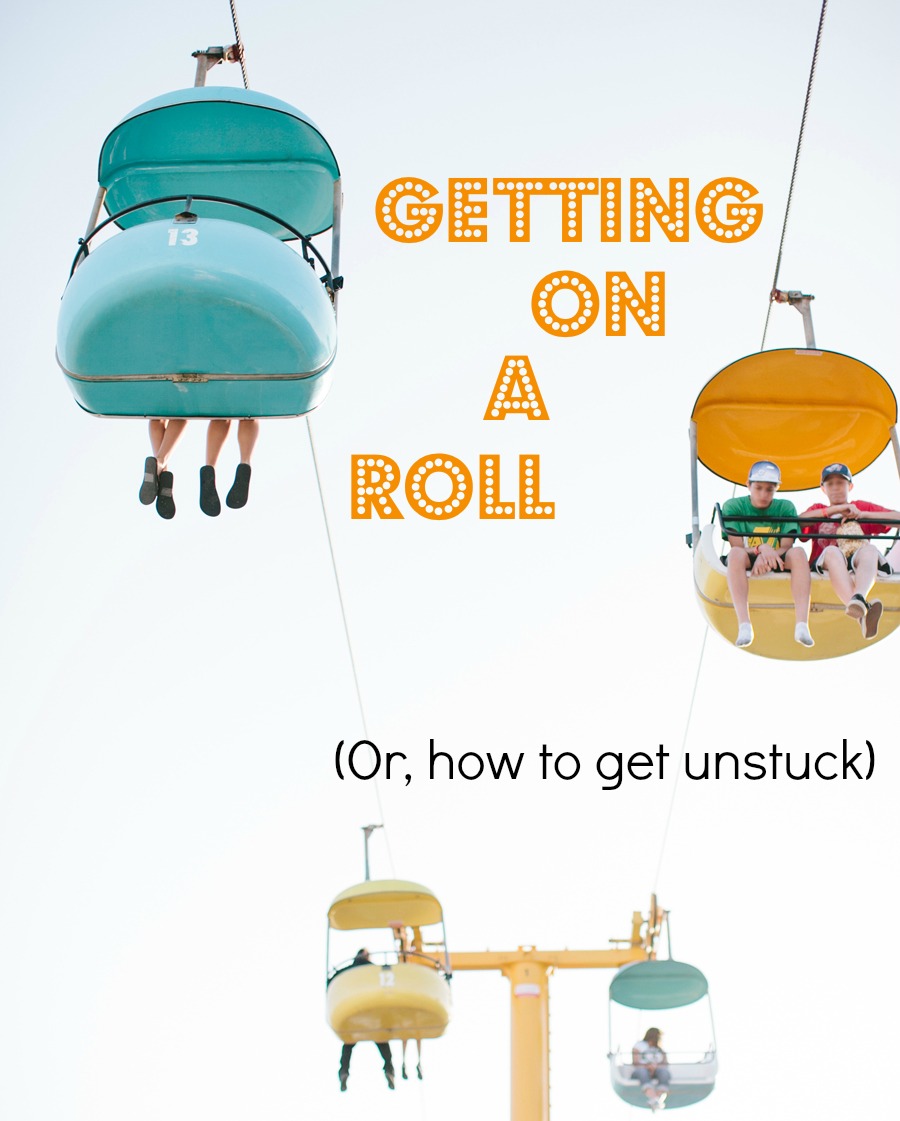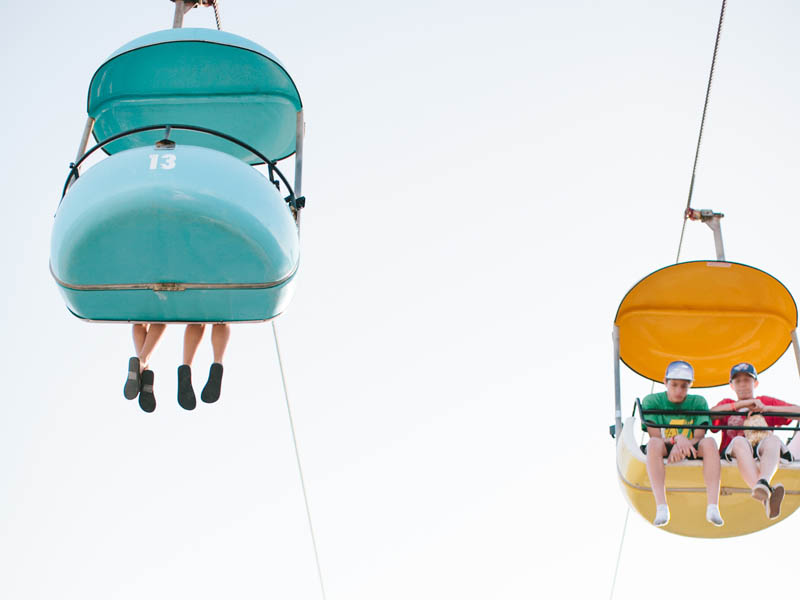Your event fills to capacity. Your article gets accepted into a magazine. You are asked to teach at a big industry conference and to do a keynote address. You receive an unexpected delivery – some fantastic products from brands you know and admire.
To top it off, two of your clients email to share how your work has changed their lives and how much they anticipate and enjoy your time together. They’ll be at your upcoming event, too.
How do some people get on a roll, while others plod on, year after year? Why do some people seem to make business look easy, while others are drowning?
Here’s my definitive guide on how to be a Roller. (Yes, this is a totally made-up word).

Creating momentum
I’m at the park with my kids. There’s a steep hill made from that bouncy material used in parks to minimise injuries from falls. Problem is, it’s quite slippery, especially so when you’re trying to walk up this little steep hill as my kids are.
My eldest daughter is trying to tackle it slowly and directly, heading straight up at the steepest gradient. My youngest daughter walks much faster, going sideways as well as up. No prizes for guessing who makes it to the top without help.
To ‘get on a roll’ and become a Roller, you need to build momentum. Momentum is not frenzied activity with no focus. Momentum is not saying yes to everything that comes along. Momentum is not working weekends and evenings and lying in bed, too wired to sleep.
Momentum is building on your actions, and taking everything that goes well as a new opportunity to take further direct action. Energy begets energy. Rollers keep taking the right action, and then the action after that.
Getting on the opportunity bus
Rollers tap into their innate creativity and its close cousin, entrepreneurism, and see opportunities everywhere. In every direction, they see an opportunity for improving something, making some communication clearer or more compelling, or making something more convenient or more efficient or effective.
They’re not worried about missing an opportunity, instead they’re cultivating the skill of deciding, which bus is heading in the direction I want to go in?
Rollers cultivate discernment as well as the courage and conviction to say ‘no’ when needed (which is rather a lot when you’re on a roll) and trust that their bus will be coming shortly.
Never stop marketing
Rollers know that marketing doesn’t stop because they’ve scored a gig. Their community is waiting to hear from them, despite the fact that they may be busy, have no capacity, or be distracted.
Of course, Rollers aren’t robots and sometimes they drop the ball – that’s only human. But they take their commitment to their community seriously. They would never hold back on sending an email to their list only when they’ve got something to sell.
Rollers are committed to regular marketing because they think of it as an ongoing conversation with people who would be more than a little confused and upset if they were to periodically go AWOL.
Rollers may or may not like the word marketing and sometimes use alternate phrases like – ‘sharing info’, ‘being helpful’, ‘solving problems’ or, (my favourite) ‘communicating’.
Creating your own luck
Rollers are often called ‘lucky’ by others who would prefer to close their eyes to work and ascribe success to happenstance instead. This can feel rather tiresome or insulting for Rollers, but they’re normally too busy to notice.
Rollers work hard at being lucky. They look out for opportunities and act on them, put deadlines in their diary so they don’t miss them, pitch themselves, practice and practice, do further training, write and journal to solidify their knowledge and understanding, and reach out to others to lift them up and cheer them along too.
Being brave
Rollers aren’t that different from anyone else when it comes to feeling brave. They often feel totally scared and sometimes downright terrified. But Rollers know there’s only one way to get over this – and that’s through acting brave.
Courage is contagious. Once the Roller has surprised themselves with what they perceive they’re capable of, they can keep banking this for future use. The Roller banks confidence and returns to it when required to make another bold move. The fear may recede somewhat, but it’s never entirely gone. The Roller acts despite fear.
Getting unstuck
Sometimes, we get into a sludge of stuck. It sticks to our feet and the back of our throat. Sometimes it’s so bad, it hurts to breathe.
When struck with stuck, we may attempt a little dance to get unstuck.
This dance normally looks like:
- Doing a lot of research or going back to university or college
- Gathering quotes from suppliers
- Talking about what you’re going to do
- Trying to analyse what went wrong
- Buying a lot of books or courses and not doing much with them.
We may do a lot of thinking and a lot of talking. We may meditate and ponder, pontificate and ruminate.
There are a few different cures for stuckness, dependent on your symptoms.
If you’re stuck in inactivity and indecision, you must act.
Almost any action will do, so long as it’s in a forward direction. Normally, this malady has presented because you’ve set your expectations sky-high and made action impossible because of it.
The cure is to lower the bar. No, even lower. Choose one small, manageable, essential task, and get going. No research. No pondering. No talking. No expectations of anything other than you taking action towards a definitive outcome. Once this is done, move onto the next task. Resist any temptation to refine, edit or redo for at least six months.
If, instead of inactivity, your symptoms are a lot of activity with little desirable outcome, your cure is different.
You need to drop things.
You are getting on bus after bus after bus, circling the city, with no destination ever reached. You need to be as ruthless as a zen monk, ‘not this’, ‘not that’.
Drop the idea that only you can save the world.
Drop the people pleasing.
Drop the old, established ideas on How Things Are Done and cultivate a beginner’s mind.
Go to an art gallery for a day. Turn off your phone. Don’t check your email for 24 hours. Whatever you naturally do, do the opposite.
This time and headspace is essential for recalibrating your sense of direction. Keep this up – it’ll do your business the world of good – and then get on the bus that’s going where you want to head. Be vigilant with halting your old unhelpful habits. Resist the temptation to get off the bus and onto another one. Keep your gaze straight ahead.





